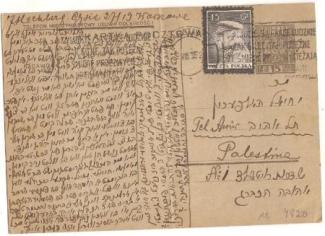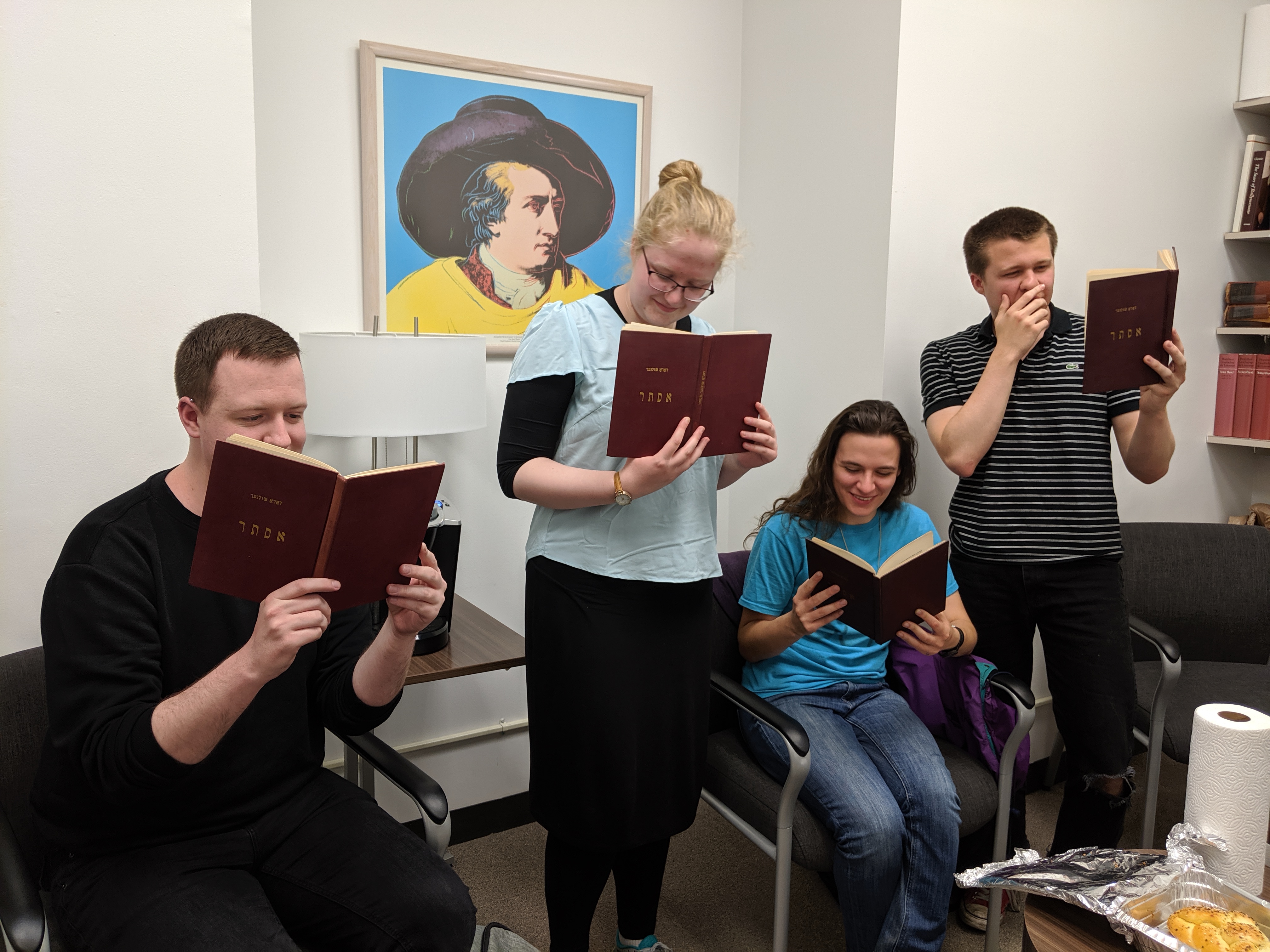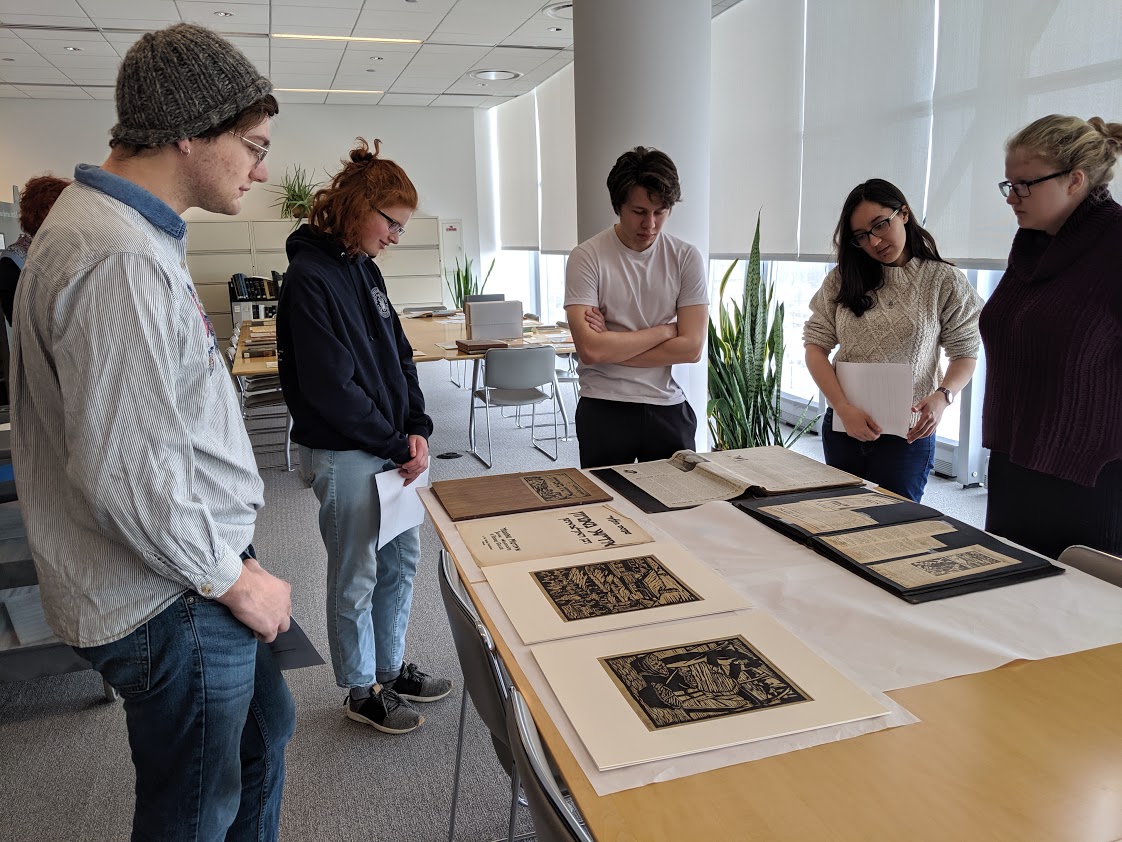
Yiddish
Students may enroll in the beginning language cycle (YIDDH 10100-10200-10300 First-Year Yiddish I-II-III) as well as the intermediate sequence (YIDDH 20100-20200) and advanced courses (YIDDH 21000, 21001, 22321). Courses above the beginning level are not offered every year. Students above the beginning level should consult the instructor to find the appropriate course for their level or to access opportunities for independent study.
Courses in Yiddish literature taught in English are offered biannually through the Germanic Studies department, and may also be available in the Comparative Literature Department. Courses in Yiddish-related topics may also be available in the History Department.
In addition to degrees in Germanic Studies, courses in Yiddish may be applied to the Major or Minor in Jewish Studies. Students interested in pursuing these degrees should consult Nancy Pardee (npardee@uchicago.edu).
Students who study in the Yiddish program may be eligible for funding for supplemental Yiddish language study in the summers or for internships. Students who study in the Yiddish program are eligible to apply for the undergraduate editorial internship at In geveb: A Journal of Yiddish Studies.
Students who elect the minor program in Yiddish Studies must meet with Jessica Kirzane, Assistant Instructional Professor in Yiddish (jkirzane@uchicago.edu) before the end of Spring Quarter of their third year to declare their intention to complete the minor and must submit a form obtained from their College adviser. Students choose courses in consultation with Dr. Kirzane. The department’s approval for the minor program should be submitted to the student's College adviser by the deadline above on the form.
Courses in the minor may not be double counted with the student's major(s) or with other minors and may not be counted toward general education requirements. Courses in the minor must be taken for quality grades, and more than half of the requirements for the minor must be met by registering for courses bearing University of Chicago course numbers. Minor program requirements are subject to revision.
For further information on the Yiddish program and on opportunities for Yiddish study, please contact Jessica Kirzane, Assistant Instructional Professor in Yiddish, jkirzane@uchicago.edu
Sample Course of Study for Yiddish Minors
1. Beginning language cycle (YIDDH 10100-10200-10300 First-Year Yiddish I-II-III)
2. YDDH 20100 – Intermediate Yiddish I
3. Two additional courses are required to complete the minor. These courses may include 20000-level Yiddish language and/or literature courses, including those taught in English on Yiddish-related subjects; as well as Yiddish-related courses in Comparative Literature or History, in consultation with Jessica Kirzane, Assistant Instructional Professor in Yiddish (jkirzane@uchicago.edu)
Other programs may be designed in consultation with Jessica Kirzane, Assistant Instructional Professor in Yiddish, and the Director of Undergraduate Studies.
Yiddish Tish
The Yiddish tish is an informal Yiddish reading and conversation group. The group meets virtually on Fridays at noon and is open to the public for Yiddish readers/speakers at the intermediate level or above. At the tish we generally read a text out loud in Yiddish and translate into English, as well as discussing the text in Yiddish. The tish is intended as an informal and welcoming space for community building around reading Yiddish. Those interested in the tish and other Yiddish related events at the University of Chicago should subscribe to the Yiddish listserv.
Additional Opportunities Outside the University
Undergraduates are eligible to apply for the Vladimir and Pearl Heifetz Memorial Fellowship and the Vivian Lefsky Hort Memorial Fellowship (for East European Jewish literature) and The Joseph Kremen Memorial Fellowship (for East European Jewish Arts, Music, and Theater) at the YIVO institute for Jewish research. These are 2-3 month in-residence (in New York) research grants: https://www.yivo.org/List-of-Fellowships. Furthermore, the Greenberg Center for Jewish Studies offers undergraduate summer research grants. For information on the Yiddish Book Center Fellowship Program, please visit: https://www.yiddishbookcenter.org/educational-programs/graduate-students/fellowship-prorgam.
Yiddish Language and Literature Courses
LANGUAGE COURSES: First-Year Sequence
The goal of this sequence is to develop proficiency in reading, writing, listening, and speaking for use in everyday communication.
Elementary Yiddish for Beginners- I
YDDH 10100
In this course, students will develop basic speaking, listening, reading, and writing skills in Yiddish. By the end of the course, students should be able to understand and participate in a conversation on a variety of everyday topics, read simple texts, be prepared to tackle more complex texts with the aid of a dictionary, and write short compositions on a variety of everyday topics. The course will also introduce students to the history of the Yiddish language and culture.
Autumn
Elementary Yiddish for Beginners- II
YDDH 10200
In this course, students will extend basic Yiddish speaking, listening, reading, and writing skills. By the end of the course, students should have a basic understanding of regional Yiddish variations in pronunciation and spelling, be able to understand and participate in a conversation in an increasingly comfortable and complex way, read simple texts with ease, have experience tackling more complex texts with the aid of a dictionary, and write short compositions with grammatical complexity. In the course of language study, students will also be exposed to key topics in the history of the Yiddish language and culture.
PQ for YDDH 10200: placement or consent of language coordinator.
Elementary Yiddish for Beginners- III
YDDH 10300
In this course, students will acquire intermediate Yiddish speaking, listening, reading, and writing skills. By the end of the course, students should be able to conduct a conversation on a wide range of topics, be comfortable tackling complex texts with the aid of a dictionary, and write short compositions with grammatical complexity. In the course of language study, students will also be exposed to key topics in the history of the Yiddish language and culture. Students will also be introduced to basic Yiddish research skills.
PQ for 10300: 10200 or placement or consent of language coordinator.
For more information about Yiddish at University of Chicago, please read the article "Yiddish Renaissance at Chicago" by graduate student Andrew Sloin, which appeared in the Spring 2005 issue of the Newsletter of the Committee on Jewish Studies, and refer to our list of Yiddish resources.
Intermediate Yiddish I
YDDH 20100
This course offers students the opportunity to study the Yiddish language at the intermediate level. It reviews and extents students' knowledge of the grammar of the Yiddish language, enhances vocabulary, and includes literary and cultural readings. Designed to further develop listening, speaking, reading comprehension, and writing skills.
Prerequisites: YDDH 10300 or consent of instructor. No auditors.
Intermediate Yiddish II: Archival Skills
YDDH 20200, JWSC 27401, YDDH 39600
This course offers students the opportunity to study the Yiddish language at the intermediate level. The focus of this course is learning to navigate and study from a variety of archival materials including newspapers, music archives, and historical texts. The course is designed to further develop listening, speaking, reading comprehension, and writing skills and to give students tools to continue Yiddish reading and research independently.
Prerequisites: YDDH 10300 or consent of instructor. No auditors.
Advanced Yiddish I
YDDH 2100, JWSC 27610, YDDH 31000
In this class, students will be exposed to essays, short stories, poetry and other writings by some of the great Yiddish writers of the twentieth century, including Abraham Reisin, Bella Chagall, Abraham Sutzkever, Esther Kreitman, and Dovid Bergelson. Students will write critical essays and creative responses, listen to excerpts read aloud, participate in discussions and debates. This course will be conducted entirely in Yiddish.
Prerequisite(s): Intermediate Yiddish I, or permission from the instructor.
Yiddish Literature in America
YDDH 22000, JWSC 27650, YDDH 32000
This course examines a wide range of Yiddish literary production in America. We will read poetry and prose from authors such as Sholem Aleichem, Isaac Bashevis Singer, Yenta Serdatsky, Morris Rosenfeld, I. J. Schwartz, Moyshe Leyb Halpern, Celia Dropkin, Lamed Shapiro, Joseph Opatoshu, Fradl Shtok, Jacob Glatstein, and Blume Lempel. We will explore themes of displacement, intergenerational conflict, race, and gender. Readings are in English translation.
Jessica Kirzane
Women Who Wrote in Yiddish, YDDH 21721/31721, JWSC 27651, GNSE 21721/31721
SPRING 2021
This course explores memoirs, plays, essays, poetry, novels, and journalistic writing of women who wrote in Yiddish, as well as a discussion of the context in which they wrote and their reception and self-perception as "women writers." Among the writers whose work may be represented in this course are Glikl, Yente Mash, Kadya Molodwsky, Chava Rosenfarb, Yente Serdatsky, Rosa Palatnik, Anna Margolin, Celia Dropkin, Rokhl Korn, Beyle Shaechter-Gottesman, Gitl Shaechter-Viswanath, Bella Chagall, Blume Lempel, Esther Kreitman, Debora Vogel, Rokhl Brokhes, Sarah Hamer-Jacklyn, Malka Lee, Ida Maze, Roshelle Weprinski, Miriam Karpilove, Zina Rabinovitz, Rokhl Szabad, Rokhl Faygnberg, Paula Prilutsky, Shira Gorshman, Esther Shumiatsher-Hirshbein and Freydl Shtok. Many of these writers have been underexamined in the history of Yiddish literary studies and this course will bring renewed attention to their work. This course will be taught in English with readings translated from Yiddish.


